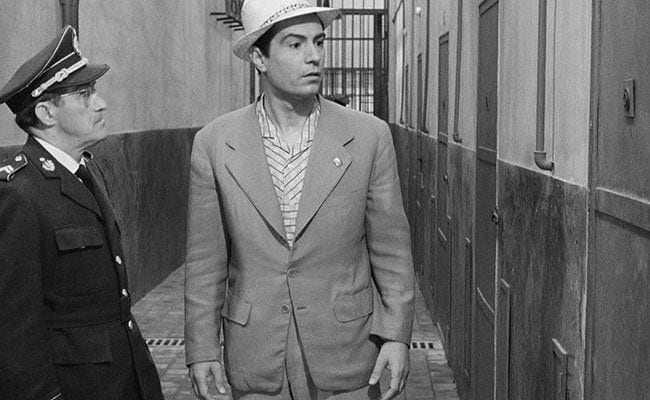
Black comedies are about breaking taboos. They’re the pranksters of the proper. They’re the dark underbelly of life’s lighter moments, which then instantly return to the abyss. Difficult to pull off and even more trying to master, they resonate with those who don’t need a cardboard cutout for coping. Instead, it’s a challenge, a choice piece of sarcasm shifted through a filter that often sees the unspoken discussed and the forbidden fleshed out.
Such is the case with The Executioner (El Verdugo in its native Spanish), a 1963 showcase for the talents of director Luis Garcia Berlanga and longtime collaborator, writer Rafael Azcona. Taking the simple idea — two misfits who can’t find love because of what they (or their family) do for a living — and marrying it to a political philosophy that comments freely on the then fascism of Franco’s regime, it’s not so much funny as it is astute, just slightly jokey when it should be jaw-dropping. If you’re looking to have your sides split, so to speak, look elsewhere. If you want filmmaking as art, you’ve come to the right place.
Of course, in 2016, the topic of death doesn’t contain as many prohibitions as it once did. Fifty years ago, those who worked in the mortuary business were seen as odd or unusual. Who would want to hang around so much grief day in and day out? When comedies were fashioned from the material — a good example would be 1965’s notorious funeral home farce The Loved One — audiences of the era rejected them outright. Today, we could easily see an entire TV series wrapped around the premise (HBO’s Six Feet Under).
As part of a beautiful restoration from the Criterion Collection, The Executioner offers the story of the aging title character (Jose Isbert) who’s heading toward retirement and looking to turn over the family “business” to his daughter’s husband. Sadly, no one wants to date his Carmen (Emma Penella) because of what he does for a living. When a mortician (Nino Manfredi) who has the same problems in his love life meets up with gal, it seems like a match made in Heaven — or the gallows. Sadly, things don’t go as smoothly as they would hope.
Trouncing both the Establishment at the time and the temperament of contemporary couples, The Executioner plays like a movie that meant a lot more back in its day. It’s still impeccably crafted and knowingly subversive, but it just doesn’t “zing” the way a modern viewer wants. We keep waiting for the punchline, the cringe-inducing crack that will transform this curiosity into a classic. Instead, we make our way through some solid social satire while coming face-to-face with the main character whose moral dilemma confuses us. No, he doesn’t mind working with the dead. Yes, he doesn’t want to contribute to their passing by taking over his father-in-law’s job at the prison.
In some ways, The Executioner is a film forged out of prisons. It’s about political traps and communal confines. It delves into the inner borders put up by its characters and careens around wildly at other naughty targets. Thanks to Criterion’s supplements — including a documentary which discusses both the film and Berlanga’s themes — we get much more out of the experience. That’s the great thing about the new digital age. A movie that might not seem relevant can be given a new sense of meaning with just a few well-selected extras. An interview with Pedro Almodovar is also excellent and adds to our overall appreciation.
There’s also a visual aesthetic at play here that really shows through, especially thanks to this new transfer. The morbid black and white accentuates the main ideas, while the attention to detail and cinematography create a world we can get lost in. Berlanga acts like a neo-realist, just one with a very skewed point of view. His presentation of Spain circa the early ’60s is like a moment in history captured and converted.
Perhaps the chief thing to remember about The Executioner is where and when it was made. The movie reminds you of this in both obvious and subtle ways. What we see on the screen is one attempt to make the point. The other is the self-censorship Berlanga and Azcona had to endure in order to get the movie made. In Franco’s era, many of the subjects they tackle would be verboten. So instead of hammering us over the head with the obvious, they take a more cautious approach. This film is a primer on censorship, both implied and real.
Though it centers around death, The Executioner wants to shine a light on a specific kind of life. When it works, we enjoy the insights. Even when it doesn’t, we can’t deny the simple power in the presentation.

